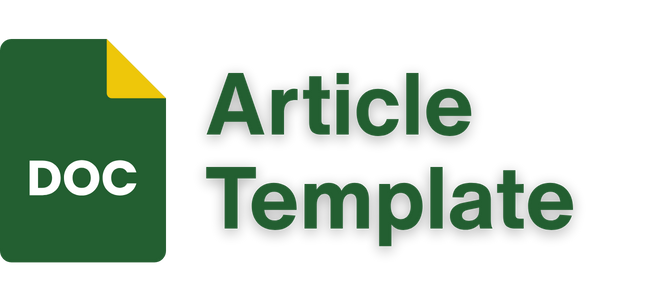DETERMINANTS OF NON-MUSLIM CREATIVE ENTREPRENEURS' INTERESTS APPLYING FINANCING AT SHARIA BANK
DOI:
https://doi.org/10.32815/jibeka.v17i2.1122Keywords:
Interest in Financing, Islamic Bank, Non-Muslim Entrepreneur, Social Influence, ReputationArticle Metrics
Abstract
Islamic banks operated based on Islamic principles and were more affected by the Covid-19 pandemic than conventional banks because of their higher fee structure. However, to restore the economy, more and more non-Muslim entrepreneurs are applying for business financing at Islamic banks. This study aimed to determine the factors that strongly influence the interest of non-Muslim creative entrepreneurs in Malang to apply for financing at Islamic banks. Using a sample of 112 creative entrepreneurs selected by accidental purposive sampling, the quantitative data obtained from distributing the questionnaires was finally analyzed using PLS-SEM high-level analysis. The study's results divulged four strong factors that influence the interest of non-Muslim creative entrepreneurs in applying for financing at Islamic banks: social influence, reputation, promotion, and services. In contrast, the other four factors did not have a strong effect. Future research is expected to consider the type of financing selected as a control variable.
Downloads
References
Abedifar, P., Hasan, I., & Tarazi, A. (2016). Finance-growth nexus and dual-banking systems: Relative importance of Islamic banks. Journal of Economic Behavior and Organization, 132, 198–215. https://doi.org/10.1016/j.jebo.2016.03.005
Ahdiat, A. (2023). Pembiayaan Syariah di Indonesia Meningkat Sepanjang 2022. Katadata.Co.Id. Retrieved from https://databoks.katadata.co.id/datapublish/2023/01/10/pembiayaan-syariah-di-indonesia-meningkat-sepanjang-2022
Aliani, K., Al-kayed, L., & Boujlil, R. (2022). COVID-19 effect on Islamic vs. conventional banks’ stock prices: Case of GCC countries. Journal of Economic Asymmetries, 26(e00263), 1–10. https://doi.org/10.1016/j.jeca.2022.e00263
Alnori, F., & Alqahtani, F. (2019). Capital structure and speed of adjustment in non-financial firms: Does sharia compliance matter? Evidence from Saudi Arabia. Emerging Markets Review, 39(August 2018), 50–67. https://doi.org/10.1016/j.ememar.2019.03.008
Ashraf, B. N., Tabash, M. I., & Hassan, M. K. (2022). Are Islamic banks more resilient to the crises vis-à-vis conventional banks? Evidence from the COVID-19 shock using stock market data. Pacific Basin Finance Journal, 73(101774), 1–22. https://doi.org/10.1016/j.pacfin.2022.101774
Azmi, N., & Riyaldi, M. H. (2019). Faktor-Faktor yang Memengaruhi Minat Pengusaha Usaha Mikro, Kecil dan Menengah (UMKM) Mengajukan Pembiayaan Di Bank Syariah (Studi Kasus pada Bank Syariah Mandiri Kantor Cabang Aceh). Jurnal Ilmiah Mahasiswa Ekonomi Islam, 1(1), 71–90.
Bangun, K. B. (2020). Alasan Non Muslim Menggunakan Tabungan Bank Syariah di Bank Sumut Syariah KCP Hamparan Perak (Universitas Islam Negeri Sumatera Utara Medan). Retrieved from http://repository.uinsu.ac.id/15201/1/skripsi perbaikan kharida.pdf
Brahmana, R. K., & You, H. W. (2022). Do Muslim CEOs and Muslim stakeholders prefer Islamic debt financing? Global Finance Journal, 54(March 2020), 100625. https://doi.org/10.1016/j.gfj.2021.100625
Brata, H. (2022, November 30). Malang Ditetapkan Sebagai Kota Kreatif Indonesia 2021. Beritajatim.Com. Retrieved from https://beritajatim.com/politik-pemerintahan/malang-ditetapkan-sebagai-kota-kreatif-indonesia-2021/
Garson, G. D. (2016). Partial Least Squares: Regression & Structural Equation Models. In Statistical Associates Publishing Publishing (2016 Editi). https://doi.org/10.3726/978-3-0353-0280-6/8
Grira, J., & Labidi, C. (2021). Banks, Funds, and risks in islamic finance: Literature & future research avenues. Finance Research Letters, 41(101815), 1–7. https://doi.org/10.1016/j.frl.2020.101815
Hair, J. J. F., Black, W. C., Babin, B. J., & Anderson, R. E. (2013). Multivariate Data Analysis. In Exploratory Data Analysis in Business and Economics (Seventh Ed). https://doi.org/10.1007/978-3-319-01517-0_3
Hair, J. J. F., Sarstedt, M., Hopkins, L., & Kuppelwiesier, V. G. (2014). Partial Least Squares Structural Equation Modeling ( PLS-SEM ) An Emerging Tool in Business Research. European Business Review, 26(2), 106–121. https://doi.org/10.1108/EBR-10-2013-0128
Hasnie, S. S. A., Collazzo, P., & Hassan, M. K. (2022). Risk assessment of equity-based conventional and islamic stock portfolios. Quarterly Review of Economics and Finance, 85, 363–378. https://doi.org/10.1016/j.qref.2022.04.010
Hassan, M. K., Aliyu, S., Huda, M., & Rashid, M. (2019). A survey on Islamic Finance and accounting standards. Borsa Istanbul Review, 19, S1–S13. https://doi.org/10.1016/j.bir.2019.07.006
Hayati, D. N. (2022). Simak, Ini Daftar 21 KaTa Kreatif 2022 Pilihan Kemenparekraf Beserta Keunggulan. Kompas.Com, pp. 9–10. Retrieved from https://travel.kompas.com/read/2022/05/23/092100127/simak-ini-daftar-21-kata-kreatif-2022-pilihan-kemenparekraf-beserta?page=all
Jabari, H. N., & Muhamad, R. (2022). Diversity and risk taking in Islamic banks: Does public listing matter? Borsa Istanbul Review, 22(3), 546–559. https://doi.org/10.1016/j.bir.2021.07.003
Mateev, M., Nasr, T., & Sahyouni, A. (2022). Capital regulation, market power and bank risk-taking in the MENA region: New evidence for Islamic and conventional banks. Quarterly Review of Economics and Finance, 86, 134–155. https://doi.org/10.1016/j.qref.2022.07.005
Maya. (2021, January). Pulihkan Ekonomi Nasional, OJK: Maksimalkan Ekonomi Syariah. Detiksumsel.Com, pp. 19–21. Retrieved from https://www.detiksumsel.com/nasional/pr-9747530967/pulihkan-ekonomi-nasional-ojkmaksimalkan-ekonomi-syariah
Nababan, C. N. (2022, March). Nasabah Non-Muslim Lengket dengan bank Syariah, Alergi Renternir. Cnnindonesia.Com. Retrieved from https://www.cnnindonesia.com/ekonomi/20220327124954-78-776676/nasabah-non-muslim-lengket-dengan-bank-syariah-alergi-rentenir
Pemkot-Malang, B. (2023). Ekonomi Kota Malang 2022 Tertinggi dalam Dasawarsa Terakhir. Malangkota.Go.Od. Retrieved from https://malangkota.go.id/2023/03/01/ekonomi-kota-malang-2022-tertinggi-dalam-dasawarsa-terakhir/
Prastiwi, I. E., & Zuhdi, M. N. (2022). Analysis of Factors Affecting Interest in Saving in Islamic Bank: Knowledge, Social Environment and Psychological Factors. International Journal of Economics, Business and Accounting Research (IJEBAR), 6(2), 770–785. https://doi.org/10.29040/ijebar.v6i2.4777
Qoyum, A., Sakti, M. R. P., Thaker, H. M. T., & AlHashfi, R. U. (2022). Does the islamic label indicate good environmental, social, and governance (ESG) performance? Evidence from sharia-compliant firms in Indonesia and Malaysia. Borsa Istanbul Review, 22(2), 306–320. https://doi.org/10.1016/j.bir.2021.06.001
Rohmah, M. M., & Rintasari, N. (2018). FACTORS AFFECTING MSME’s INTEREST TO APPLY FOR BUSINESS FINANCING IN ISLAMIC FINANCIAL INSTITUTIONS. Muhammadiyah International Journal of Economics and Business, 1(2), 121–128. https://doi.org/10.23917/mijeb.v1i2.9368
Siddique, M. A., & Zahid Siddique, M. (2022). Intrinsically irreconcilable: The case against running musharakah as employed by Islamic banks. Borsa Istanbul Review, 22(5), 861–872. https://doi.org/10.1016/j.bir.2022.06.003
Syahriyatul Muharromah, Huda, N., Muslikh, M., & Rini, N. (2021). Factors That Influence Public Interest In Choosing Islamic Bank Financing Products. Jurnal Organisasi Dan Manajemen, 17(1), 53–66. https://doi.org/10.33830/jom.v17i1.1085.2021
Trinugroho, I., Santoso, W., Irawanto, R., & Pamungkas, P. (2021). Is spin-off policy an effective way to improve performance of Islamic banks? Evidence from Indonesia. Research in International Business and Finance, 56(101352), 1–19. https://doi.org/10.1016/j.ribaf.2020.101352
Warninda, T. D., Ekaputra, I. A., & Rokhim, R. (2019). Do Mudarabah and Musharakah financing impact Islamic Bank credit risk differently? Research in International Business and Finance, 49, 166–175. https://doi.org/10.1016/j.ribaf.2019.03.002
Downloads
Published
How to Cite
Issue
Section
License
Happy reading. Don't be shy to cite








